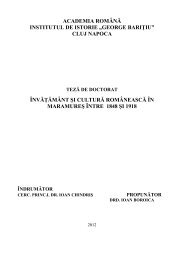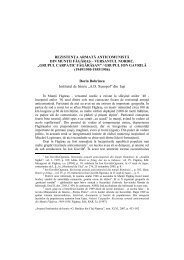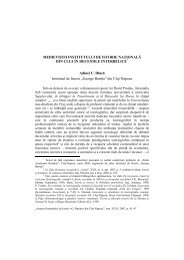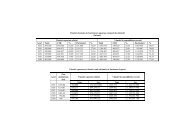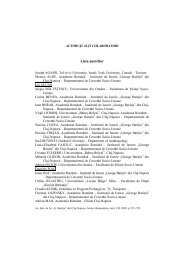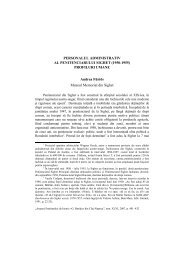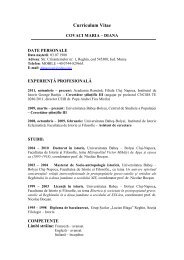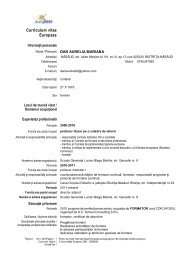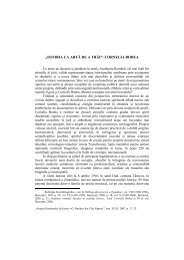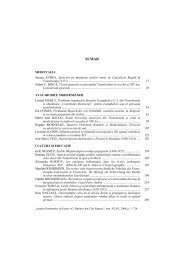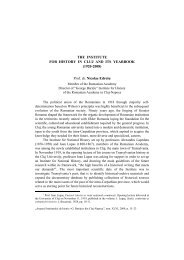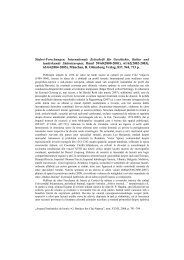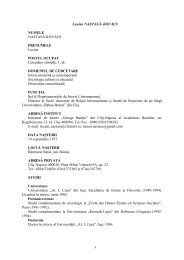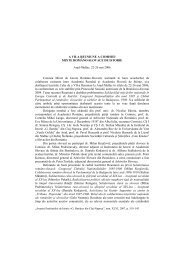- Page 2 and 3:
INSTITUTULUI DE ISTORIE „GEORGE B
- Page 4 and 5:
CUVÂNT ÎNAINTE Cunoaştere, Inter
- Page 6 and 7:
6 Cunoaştere, Interes, Responsabil
- Page 8 and 9:
8 Cunoaştere, Interes, Responsabil
- Page 10 and 11:
10 Cunoaştere, Interes, Responsabi
- Page 12 and 13:
12 Cunoaştere, Interes, Responsabi
- Page 14 and 15:
14 Nicolae Edroiu 2 Acumularea pozi
- Page 16 and 17:
16 Nicolae Edroiu 4 mai insistent c
- Page 18 and 19:
18 Aurel Negucioiu 2 În prezent, s
- Page 20 and 21:
20 Aurel Negucioiu 4 Mediocritatea
- Page 22 and 23:
22 Aurel Negucioiu 6 „Bun”, scr
- Page 24 and 25:
24 Aurel Negucioiu 8 supravieţuire
- Page 26 and 27:
26 Aurel Negucioiu 10 5. TRANSFORMA
- Page 28 and 29:
28 Aurel Negucioiu 12 Tabelul 1 Cel
- Page 30 and 31:
30 Aurel Negucioiu 14 g) lipsa de c
- Page 32 and 33:
32 Radu Danciu 2 1. SPECIALIZAREA
- Page 34 and 35:
34 Radu Danciu 4 • Contabilitate
- Page 36 and 37:
36 Radu Danciu 6 semestre se vor st
- Page 38 and 39:
38 Radu Danciu 8 nivelul superior,
- Page 40 and 41:
40 Vasile Marian 2 pensions of the
- Page 42 and 43:
42 Vasile Marian 4 În opinia noast
- Page 44 and 45:
44 Vasile Marian 6 sau nu mai are d
- Page 46 and 47:
46 Vasile Marian 8 ceva inginerii f
- Page 48 and 49:
48 Vasile Marian 10 miliarde de dol
- Page 50 and 51:
50 Vasile Marian 12 pensii şi alte
- Page 52 and 53:
52 Vasile Marian 14 iar pentru 40 l
- Page 54 and 55:
54 Vasile Marian 16 condiţiile pre
- Page 56 and 57:
56 Vasile Marian 18 arăta că pens
- Page 58 and 59:
58 Vasile Marian 20 în sistemul pu
- Page 60 and 61:
60 Vasile Marian 22 alimentată sin
- Page 62 and 63:
62 Vasile Marian 24 Tabelul 6 Nivel
- Page 64 and 65:
64 Vasile Marian 26 până la 98,2%
- Page 66 and 67:
66 Vasile Marian 28 stagiul de coti
- Page 68 and 69:
68 Vasile Marian 30 randament se î
- Page 70 and 71:
70 Vasile Marian 32 asigurare de a-
- Page 72 and 73:
72 Andrei Negru 2 socială consider
- Page 74 and 75:
74 Andrei Negru 4 româneşti pe c
- Page 76 and 77:
76 Andrei Negru 6 efectuării unui
- Page 78 and 79:
78 Andrei Negru 8 Prin urmare, decl
- Page 80 and 81:
80 Andrei Negru 10 monografică des
- Page 82 and 83:
82 Aurel Teodor Codoban 2 senzorial
- Page 84 and 85:
84 Aurel Teodor Codoban 4 odată cu
- Page 86 and 87:
86 Aurel Teodor Codoban 6 gustul, n
- Page 88 and 89:
88 Aurel Teodor Codoban 8 nevoie de
- Page 90 and 91:
90 Aurel Teodor Codoban 10 comunic
- Page 92 and 93:
92 Ioan Mihuţ 2 2. PERCEPŢIA MANA
- Page 94 and 95:
94 Ioan Mihuţ 4 3. SURSELE CONFLIC
- Page 96 and 97:
96 Ioan Mihuţ 6 primeşte un salar
- Page 98 and 99:
98 Ioan Mihuţ 8 conflictului evide
- Page 100 and 101:
100 Ioan Mihuţ 10 Fig. 5. Stadiile
- Page 102 and 103:
102 Ioan Mihuţ 12 BIBLIOGRAFIE COD
- Page 104 and 105:
104 Vasile Zaharia 2 pay more atten
- Page 106 and 107:
106 Vasile Zaharia 4 A ajunge îns
- Page 108 and 109:
108 Vasile Zaharia 6 analiza concep
- Page 110 and 111:
110 Vasile Zaharia 8 Demersul metod
- Page 112 and 113: 112 Vasile Zaharia 10 culturale, sa
- Page 114 and 115: 114 Vasile Zaharia 12 - „fonduri
- Page 116 and 117: 116 Vasile Zaharia 14 avea parte fi
- Page 118 and 119: 118 Vasile Zaharia 16 repartizarea
- Page 120 and 121: 120 Vasile Zaharia 18 resurse devin
- Page 122 and 123: 122 Emil Pop 2 modernă, credem că
- Page 124 and 125: 124 Emil Pop 4 funcţii, cultura co
- Page 126 and 127: 126 Emil Pop 6 sale culturale 6 ,
- Page 128 and 129: 128 Emil Pop 8 personalităţii, pe
- Page 130 and 131: 130 Emil Pop 10 este cultură care
- Page 132 and 133: 132 Emil Pop 12 premisa instituirii
- Page 134 and 135: 134 Emil Pop 14 Conştientizarea pr
- Page 136 and 137: 136 Anton Drăgoescu 2 În mediul n
- Page 138 and 139: 138 Anton Drăgoescu 4 de forţe
- Page 140 and 141: 140 Anton Drăgoescu 6 date permane
- Page 142 and 143: 142 Anton Drăgoescu 8 majorităţi
- Page 144 and 145: 144 Anton Drăgoescu 10 susţinând
- Page 146 and 147: 146 Călina Jugastru 2 Într-o inte
- Page 148 and 149: 148 Călina Jugastru 4 corporale po
- Page 150 and 151: 150 Călina Jugastru 6 vreunui inte
- Page 152 and 153: 152 Călina Jugastru 8 juvenil (des
- Page 154 and 155: 154 Călina Jugastru 10 Pretium dol
- Page 156 and 157: 156 Corina Rusu 2 contribuie şi î
- Page 158 and 159: 158 Corina Rusu 4 revendicările fi
- Page 160 and 161: 160 Corina Rusu 6 ca element struct
- Page 164 and 165: 164 Silviu G. Totelecan 2 celor car
- Page 166 and 167: 166 Silviu G. Totelecan 4 împletir
- Page 168 and 169: 168 Silviu G. Totelecan 6 confrunt
- Page 170 and 171: 170 Silviu G. Totelecan 8 Deschider
- Page 172 and 173: 172 Ionuţ Isac 2 De pildă, un asp
- Page 174 and 175: 174 Ionuţ Isac 4 afective diferă
- Page 176 and 177: 176 Ionuţ Isac 6 simţ: trebuie s
- Page 178 and 179: 178 Ionuţ Isac 8 cu grade variabil
- Page 180 and 181: 180 Ioan Trenca, Dragoş Păun 2 La
- Page 182 and 183: 182 Ioan Trenca, Dragoş Păun 4 ş
- Page 184 and 185: 184 Ioan Trenca, Dragoş Păun 6 ma
- Page 186 and 187: 186 Ioan Trenca, Dragoş Păun 8 ma
- Page 188 and 189: 188 Ioan Trenca, Dragoş Păun 10 a
- Page 190 and 191: 190 Ioan Trenca, Dragoş Păun 12 d
- Page 192 and 193: 192 Ioan Trenca, Dragoş Păun 14 c
- Page 194 and 195: 194 Ioan Trenca, Dragoş Păun 16 e
- Page 196 and 197: 196 Ioan Trenca, Dragoş Păun 18 4
- Page 198 and 199: 198 Ioan Trenca, Dragoş Păun 20 B
- Page 200 and 201: 200 Maria Miruna Pochea, Ioan I. Tr
- Page 202 and 203: 202 Maria Miruna Pochea, Ioan I. Tr
- Page 204 and 205: 204 Maria Miruna Pochea, Ioan I. Tr
- Page 206 and 207: 206 Maria Miruna Pochea, Ioan I. Tr
- Page 208 and 209: 208 Maria Miruna Pochea, Ioan I. Tr
- Page 210 and 211: 210 Maria Miruna Pochea, Ioan I. Tr
- Page 212 and 213:
212 Maria Miruna Pochea, Ioan I. Tr
- Page 214 and 215:
214 Cristina Fleşeriu, Adam Fleşe
- Page 216 and 217:
216 Cristina Fleşeriu, Adam Fleşe
- Page 218 and 219:
218 Cristina Fleşeriu, Adam Fleşe
- Page 220 and 221:
220 Cristina Fleşeriu, Adam Fleşe
- Page 222 and 223:
222 Cristina Fleşeriu, Adam Fleşe
- Page 224 and 225:
224 Cristina Fleşeriu, Adam Fleşe
- Page 226 and 227:
226 Cristina Fleşeriu, Adam Fleşe
- Page 228 and 229:
228 Cristina Fleşeriu, Adam Fleşe
- Page 230 and 231:
230 Cristina Fleşeriu, Adam Fleşe
- Page 232 and 233:
232 Cristina Fleşeriu, Adam Fleşe
- Page 234 and 235:
234 Georgeta Ancuţa Şpan, Ioan Op
- Page 236 and 237:
236 Georgeta Ancuţa Şpan, Ioan Op
- Page 238 and 239:
238 Georgeta Ancuţa Şpan, Ioan Op
- Page 240 and 241:
240 Georgeta Ancuţa Şpan, Ioan Op
- Page 242 and 243:
242 Georgeta Ancuţa Şpan, Ioan Op
- Page 244 and 245:
244 Sebastian Spinei 2 independente
- Page 246 and 247:
246 Sebastian Spinei 4 gouvernement
- Page 248 and 249:
248 Sebastian Spinei 6 titularului
- Page 250 and 251:
250 Sebastian Spinei 8 Principiul e
- Page 252 and 253:
252 Sebastian Spinei 10 nelitigioas
- Page 254 and 255:
254 Sebastian Spinei 12 profesiuni
- Page 256 and 257:
256 Sebastian Spinei 14 persoanelor
- Page 258 and 259:
258 Diana Hancu 2 Ca urmare a turbu
- Page 260 and 261:
260 Diana Hancu 4 confirmarea faptu
- Page 262 and 263:
262 Diana Hancu 6 european de asigu
- Page 264 and 265:
264 Diana Hancu 8 format din Grupul
- Page 266 and 267:
266 Diana Hancu 10 Deşi criza în
- Page 268 and 269:
268 Diana Hancu 12 industria servic
- Page 270 and 271:
270 Andrei Rădulescu 2 Economia mo
- Page 272 and 273:
272 Andrei Rădulescu 4 Măsurile e
- Page 274 and 275:
274 Andrei Rădulescu 6 internaţio
- Page 276 and 277:
276 Andrei Rădulescu 8 Cu toate ac
- Page 278 and 279:
278 Marius Deac 2 fundamentare soli
- Page 280 and 281:
280 Marius Deac 4 Indicatori Tabelu
- Page 282 and 283:
282 Marius Deac 6 Tabelul 4 Element
- Page 284 and 285:
284 Marius Deac 8 principal de o bu
- Page 286 and 287:
286 Adrian Circa 2 faptul că o voi
- Page 288 and 289:
288 Adrian Circa 4 contractelor pe
- Page 290 and 291:
290 Adrian Circa 6 au participat la
- Page 292 and 293:
292 Adrian Circa 8 persoane decât
- Page 294 and 295:
294 Adrian Circa 10 Curţii de casa
- Page 296 and 297:
296 Adrian Circa 12 juris transferr
- Page 298 and 299:
298 Adrian Circa 14 Noul Cod civil
- Page 300 and 301:
300 Adrian Circa 16 de cauză credi
- Page 302 and 303:
302 Smaranda Nicoleta Lup Pop 2 con
- Page 304 and 305:
304 Smaranda Nicoleta Lup Pop 4 - D
- Page 306 and 307:
306 Smaranda Nicoleta Lup Pop 6 Tab
- Page 308 and 309:
308 Smaranda Nicoleta Lup Pop 8 arg
- Page 310 and 311:
310 Smaranda Nicoleta Lup Pop 10 fu
- Page 312 and 313:
312 Smaranda Nicoleta Lup Pop 12 Mo
- Page 314 and 315:
314 Smaranda Nicoleta Lup Pop 14 au
- Page 316 and 317:
316 Alina Daniela Ivanov 2 Din păc
- Page 318 and 319:
318 Alina Daniela Ivanov 4 Pentru a
- Page 320 and 321:
320 Alina Daniela Ivanov 6 Dar, din
- Page 322 and 323:
322 Alina Daniela Ivanov 8 Oricum a
- Page 324:
324 Cunoaştere, Interes, Responsab



